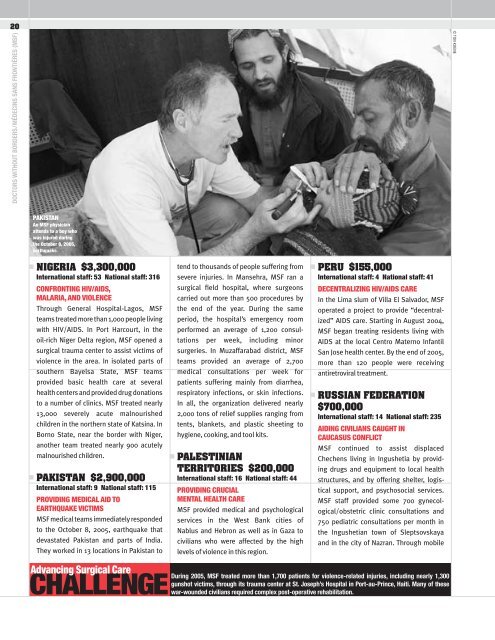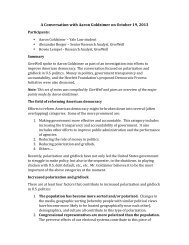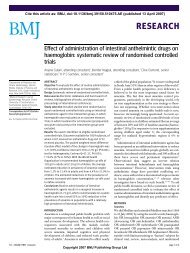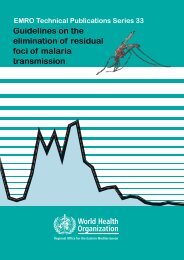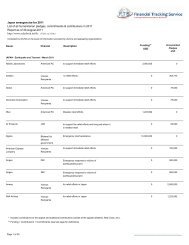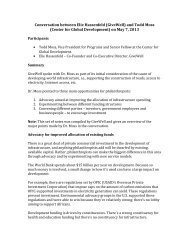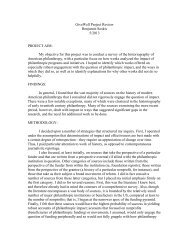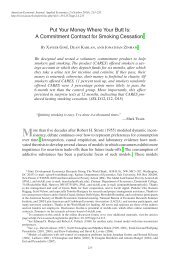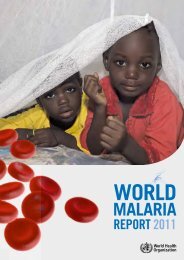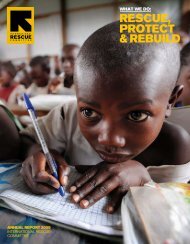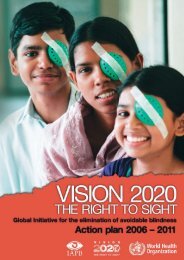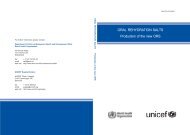Annual Report 2005 - Doctors Without Borders
Annual Report 2005 - Doctors Without Borders
Annual Report 2005 - Doctors Without Borders
You also want an ePaper? Increase the reach of your titles
YUMPU automatically turns print PDFs into web optimized ePapers that Google loves.
20<strong>Doctors</strong> <strong>Without</strong> borders/MÉdecins sans frontiÈres (MSF)© Ton KoenePakistanAn MSF physicianattends to a boy whowas injured duringthe October 8, <strong>2005</strong>,earthquake.NIGERIA $3,300,000International staff: 53 National staff: 316Confronting HIV/AIDS,malaria, and violenceThrough General Hospital-Lagos, MSFteams treated more than 1,000 people livingwith HIV/AIDS. In Port Harcourt, in theoil-rich Niger Delta region, MSF opened asurgical trauma center to assist victims ofviolence in the area. In isolated parts ofsouthern Bayelsa State, MSF teamsprovided basic health care at severalhealth centers and provided drug donationsto a number of clinics. MSF treated nearly13,000 severely acute malnourishedchildren in the northern state of Katsina. InBorno State, near the border with Niger,another team treated nearly 900 acutelymalnourished children.PAKISTAN $2,900,000International staff: 9 National staff: 115Providing medical aid toearthquake victimsMSF medical teams immediately respondedto the October 8, <strong>2005</strong>, earthquake thatdevastated Pakistan and parts of India.They worked in 13 locations in Pakistan totend to thousands of people suffering fromsevere injuries. In Mansehra, MSF ran asurgical field hospital, where surgeonscarried out more than 500 procedures bythe end of the year. During the sameperiod, the hospital’s emergency roomperformed an average of 1,200 consultationsper week, including minorsurgeries. In Muzaffarabad district, MSFteams provided an average of 2,700medical consultations per week forpatients suffering mainly from diarrhea,respiratory infections, or skin infections.In all, the organization delivered nearly2,000 tons of relief supplies ranging fromtents, blankets, and plastic sheeting tohygiene, cooking, and tool kits.PALESTINIANTERRITORIES $200,000International staff: 16 National staff: 44Providing crucialmental health careMSF provided medical and psychologicalservices in the West Bank cities ofNablus and Hebron as well as in Gaza tocivilians who were affected by the highlevels of violence in this region.PERU $155,000International staff: 4 National staff: 41Decentralizing HIV/AIDS careIn the Lima slum of Villa El Salvador, MSFoperated a project to provide “decentralized”AIDS care. Starting in August 2004,MSF began treating residents living withAIDS at the local Centro Materno InfantilSan Jose health center. By the end of <strong>2005</strong>,more than 120 people were receivingantiretroviral treatment.RUSSIAN FEDERATION$700,000International staff: 14 National staff: 235Aiding civilians caught inCaucasus conflictMSF continued to assist displacedChechens living in Ingushetia by providingdrugs and equipment to local healthstructures, and by offering shelter, logisticalsupport, and psychosocial services.MSF staff provided some 700 gynecological/obstetricclinic consultations and750 pediatric consultations per month inthe Ingushetian town of Sleptsovskayaand in the city of Nazran. Through mobileAdvancing Surgical CareDuring <strong>2005</strong>, MSF treated more than 1,700 patients for violence-related injuries, including nearly 1,300gunshot victims, through its trauma center at St. Joseph’s Hospital in Port-au-Prince, Haiti. Many of thesechallengewar-wounded civilians required complex post-operative rehabilitation.


